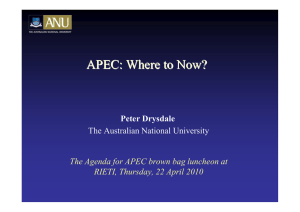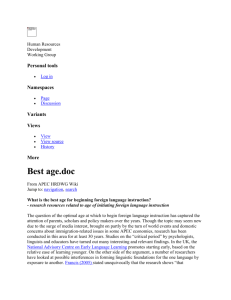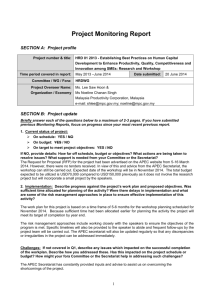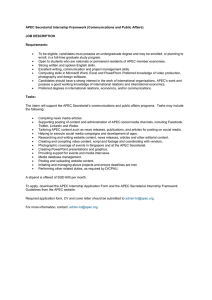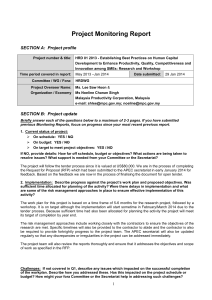3rd APEC Conference on Cooperation in Higher Education in Asia
advertisement
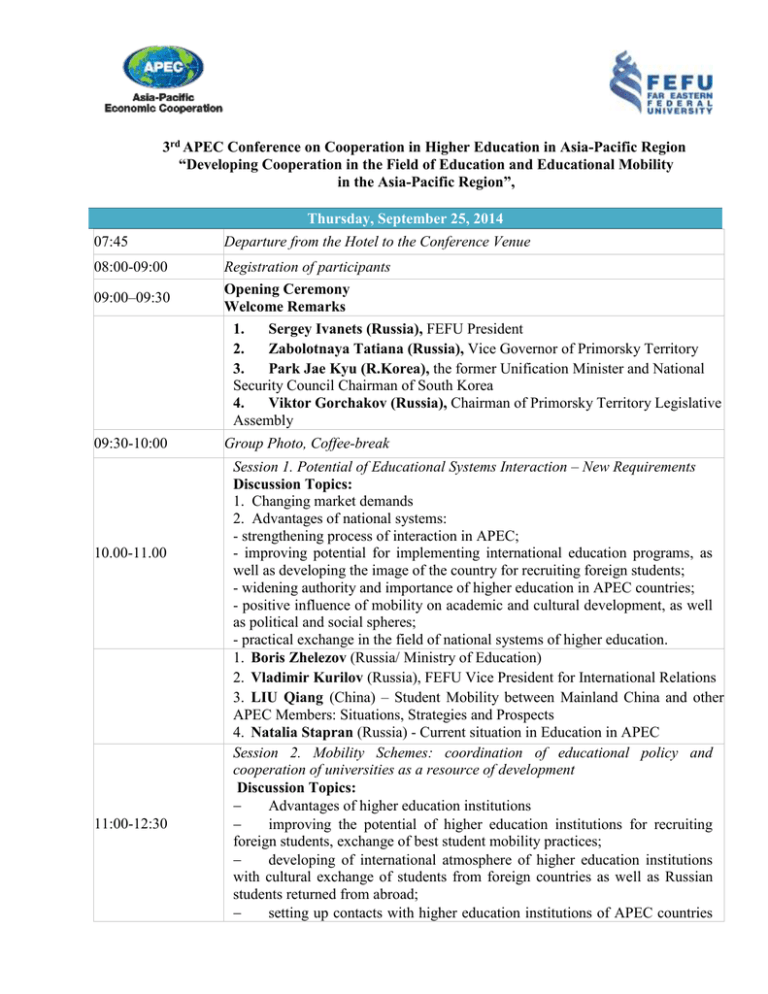
3rd APEC Conference on Cooperation in Higher Education in Asia-Pacific Region “Developing Cooperation in the Field of Education and Educational Mobility in the Asia-Pacific Region”, Thursday, September 25, 2014 07:45 Departure from the Hotel to the Conference Venue 08:00-09:00 Registration of participants Opening Ceremony Welcome Remarks 1. Sergey Ivanets (Russia), FEFU President 2. Zabolotnaya Tatiana (Russia), Vice Governor of Primorsky Territory 3. Park Jae Kyu (R.Korea), the former Unification Minister and National Security Council Chairman of South Korea 4. Viktor Gorchakov (Russia), Chairman of Primorsky Territory Legislative Assembly 09:00–09:30 09:30-10:00 10.00-11.00 11:00-12:30 Group Photo, Coffee-break Session 1. Potential of Educational Systems Interaction – New Requirements Discussion Topics: 1. Changing market demands 2. Advantages of national systems: - strengthening process of interaction in APEC; - improving potential for implementing international education programs, as well as developing the image of the country for recruiting foreign students; - widening authority and importance of higher education in APEC countries; - positive influence of mobility on academic and cultural development, as well as political and social spheres; - practical exchange in the field of national systems of higher education. 1. Boris Zhelezov (Russia/ Ministry of Education) 2. Vladimir Kurilov (Russia), FEFU Vice President for International Relations 3. LIU Qiang (China) – Student Mobility between Mainland China and other APEC Members: Situations, Strategies and Prospects 4. Natalia Stapran (Russia) - Current situation in Education in APEC Session 2. Mobility Schemes: coordination of educational policy and cooperation of universities as a resource of development Discussion Topics: Advantages of higher education institutions improving the potential of higher education institutions for recruiting foreign students, exchange of best student mobility practices; developing of international atmosphere of higher education institutions with cultural exchange of students from foreign countries as well as Russian students returned from abroad; setting up contacts with higher education institutions of APEC countries for further cooperation in mobility development; methodological and legislative support to higher education, at the national level, opportunities to coordinate systems of education among various economics, countries; social, economic, cultural and political factors of university development 12:30-14:00 14:00-15:30 15.30-16.00 16.00-17.00 1. Dr. Anita Aziz (Brunei Darussalam/ Ministry of Education) - Megaminx Impact of Student Mobility: Key Role for Tertiary Learning Dr. Joyce Teo (Brunei Darussalam) - Megaminx Impact of Student Mobility: Key Role for Tertiary Learning 2. Dr. Minella C. Alarcon (Philippines/ Ministry of Education) - Working towards an APEC mobility scheme in science and technology 3. Fermin Maximo Saavedra Cano (Peru) Cooperation and development on higher education matters in Peru under the APEC Lunch Session 2. (Continuation) Mobility Schemes: coordination of educational policy and cooperation of universities as a resource of development Discussion Topics: new forms of education; APEC cooperative educational projects: history and prospects; student, faculty and staff mobility; development of cooperation in the field of mutual credit, qualification and diploma recognition; quality assurance in higher education; challenges of networking cooperation between universities in education and research. 1. Michele Robinson (Australia/ Macquarie University) – Student mobility at Macquarie University - best practice 2. Naina Ksenofontova (Russia/Director of the Institute of the East, NorthEastern Federal University named after M.K. Ammosov) - University - as the territory of friendly dialogue and international cooperation 3. Valeriy Temchenko (Russia/Training Center for Customs Control of Fissionable and Radioactive Materials, Vladivostok Branch, Russian Customs Academy) - The Educational Technologies Transfer in the Area of Radiation Safety and Radiation Control at the Border: the Contribution and Potential of the Vladivostok Branch of the Russian Customs Academy 4. Valentin Shipulin (Russia) - On the prospects of cooperation between the North-Caucasus Federal University and universities in the APEC region 5. Sergey Pishun (Russia) – Universities Network Cooperation in terms of world universities differentiation Coffee-break Session 3. Initiative on development and introduction of APEC Academic Mobility Card in formation of educational systems mobility in the APEC region Discussion Topics: promotion individual and socio-cultural ties with students from other countries; expansion of academic horizons and enhancement the prospects for future employment; developing the ability to work in an international environment; enhancing personal and intellectual maturity through the development of flexibility, resilience, cross-cultural communication skills, an ability to adapt to new circumstances and to constructively solve problems based on cultural differences; use of best practices for development and introduction of region-wide and joint education programs; opportunities and barriers to intensification of cross-border exchanges in the field of education; case studies on cross educational interaction, as well as research, information and knowledge sharing. 1. Natalia Stapran (Russia) - APEC Academic Mobility Card 2. Evgenia Vorontsova, Ilia Krasilnikov, (Russia) – First Steps in APEC Academic Mobility Card Implementation 17.00-18.00 18.30 Closing Session Wrap-up, Adoption of recommendations Welcome Dinner Friday, September 26, 2014 10.00 – 14.00 Vladivostok sightseeing tour 14.00 – 15.00 Lunch 15.30 – 21.00 Bilateral meetings (optional) Departure SUMMARY REPORT of THE 3rd APEC CONFERENCE ON COOPERATION IN HIGHER EDUCATION IN THE ASIA-PACIFIC REGION «DEVELOPING COOPERATION IN THE FIELD OF EDUCATION AND EDUCATIONAL MOBILITY IN THE ASIA-PACIFIC REGION» The 3rd APEC conference on cooperation in higher education in the Asia-Pacific Region (APEC CCHE APR’2014) was organized by the Ministry of Education and Science of the Russian Federation together with the Far Eastern Federal University and took place on Russky Island, Vladivostok on 25 September, 2014. The APEC CCHE APR’2014 was attended by delegations from 10 APEC economies: Australia, Brunei Darussalam, China, Japan, Republic of Korea, Peru, Philippines, Thailand, Russia, Vietnam, USA. APEC CCHE APR’2014 addressed: 1. Potential of Educational Systems Interaction – New Requirements 2. Mobility Schemes: coordination of educational policy and cooperation of universities as a resource of development 3. Initiative on development and introduction of APEC Academic Mobility Card in formation of educational systems mobility in the APEC region* The Conference stimulated productive and useful discussion of government and academia representatives that provided many useful ideas for potential consideration within APEC. Some of these ideas have been captured below. Recommendations: • To promote academic (students, researchers, providers) mobility through: - addressing various barriers (language, financial, bureaucratic etc.) - developing short-term mobility programmes - providing international students scholarships - mapping quality assessment systems across APEC economies - engaging students and researchers in cross-boarder science and technology collaboration in person or virtually; - promoting joint research and publication among researchers across APEC economies; - establishing scientific networks and supporting cross-border networking of scientists through scholarships and mobility funds; - eliminating negative consequences of academic mobility by promoting fair intellectual property agreements for researchers; • To encourage activities of newly established APEC Higher Education Research Centre (AHERC) such as: - mapping regulations and practices across APEC economies in higher education cooperation and academic mobility; - identification of individual capacity building and technical assistance needs in market access and trade facilitation in education services in the APEC region; 2 - study and exchange of best practices and successful mechanisms of crossborder research collaboration identify promising research areas for collaboration; benchmarking and identification of best practices in APEC on quality assurance systems • To support further activities aimed at elaboration of APEC Academic Mobility card that potentially can provide rewards and incentives for creation of open educational resources and intensify exchange of educational content (online courses, digital databases and libraries, digitized texts etc.) with respect to the intellectual property rights. • To support Philippines’ plan to host the High Level Policy Dialogue in Science and Technology in Higher Education on July 6-7, 2015 during APEC 2015 and discuss the following topics, respectively: • Ensuring Relevance, Utilization and Contribution of Products of S&T in Higher Education to Economic Development in the APEC Region, in the context of Environment, Disaster Prevention, Climate Change and Energy • Technologies and S&T Concerns of the Future: Implications for Future Careers, in the context of Smart Analytics and Engineering Innovations • To organise in September 2015 the 4th annual APEC conference on cooperation in higher education in Vladivostok, Russian Federation, with possible topic “Quality assurance in higher education in Asia-Pacific ” Resolution: In the reality of the XXI century mobility of education is of great importance for economic development. Economic rationales are increasingly driving a large part of the cross border supply of education. In the Information Age the role of virtual exchange of educational content has increased that adds a new dimension to the customary interpretation of academic mobility. Various academic mobility schemes and mechanisms should be elaborated, including voluntary implementation of ‘Virtual’ Academic Mobility Card (VAMC).
